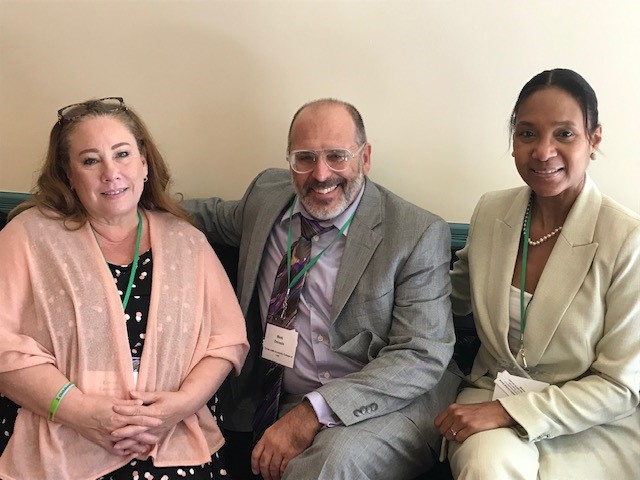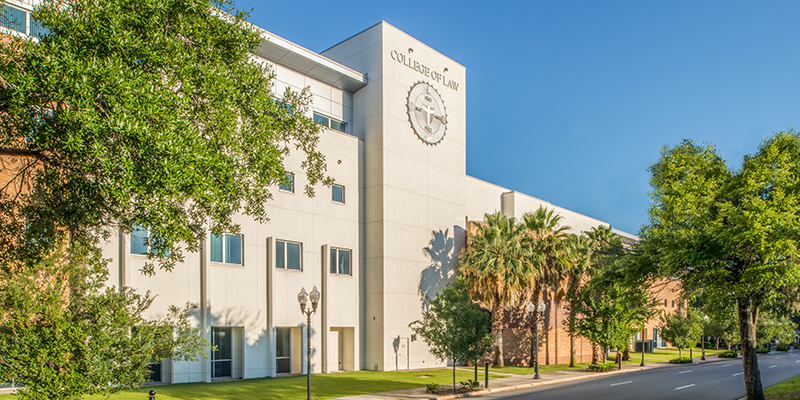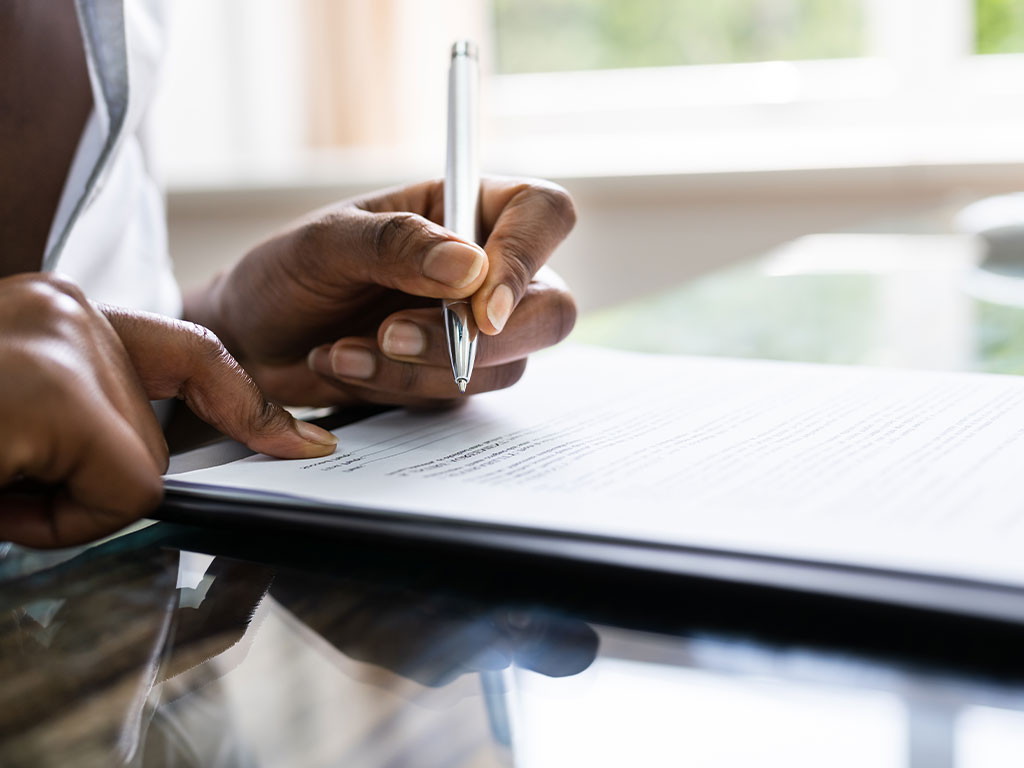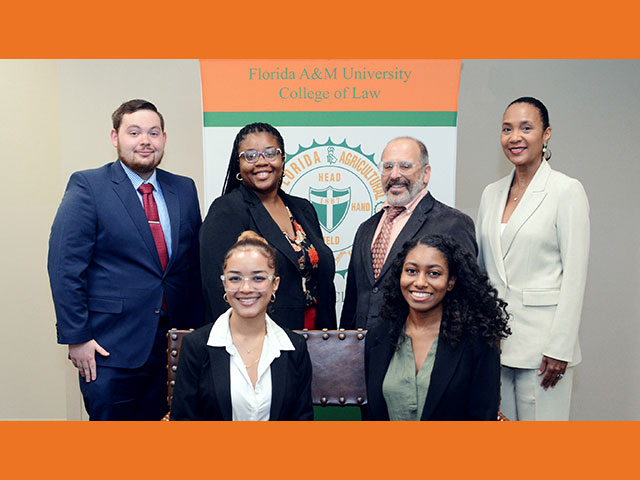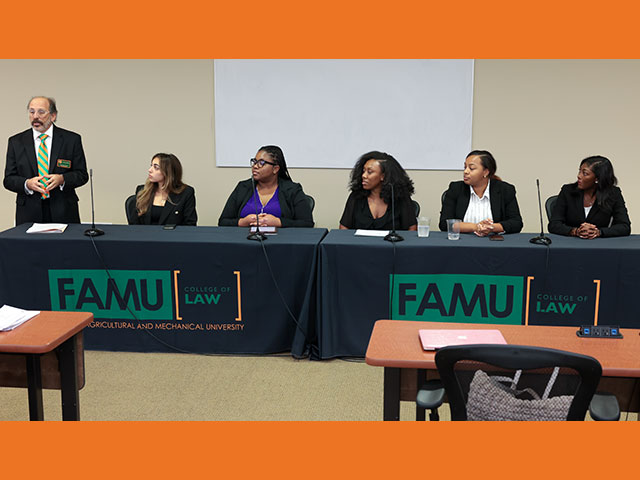Legal Clinics/ Experiential Education
The Clinic application: Click here.
The Instructions for the Field Placement application: Click here.
Field Placement application: Click here.
Legal Clinics
The Legal Clinical Program offers eligible upper-level students the opportunity to serve traditionally underserved clients under the supervision of a faculty member admitted to practice. There are currently three clinics:
Certified Legal Intern:
The College of Law strongly recommends that students interested in enrolling in a clinic or field placement become a Certified Legal Intern (“CLI”) pursuant to the requirements of the Student Practice Rule of the Florida Bar. Students who become certified can appear and argue in court, sign legal documents, and handle a range of case advocacy and litigation responsibilities. CLI is invaluable in maximizing your experiential learning opportunities and can improve the chances for employment after graduation.
To become CLI eligible students must register with the Florida Board of Bar Examiners and receive a “Notice of Registrant Clearance.” Because this process takes time, students should file their application during the first year of law school. Students who are not sure or do not intend to sit for the FL Bar can also apply to become a CLI. Once you receive your clearance letter and are enrolled in a CLI eligible clinic or field placement, clinic faculty will assist you in completing the process.
Field Placements:
Field placements offer students semester-long opportunities to leave the traditional classroom setting and, under supervision of a clinic faculty member and a licensed attorney at an approved site, engage directly in the practice of law. Students may receive up to 4 credits during the fall and spring semesters, and up to 6 credits in summer (with clinic faculty approval). Students can earn no more than 9 total field placement credits.
The Field Placement course requires both direct legal work at the placement site and a seminar class that requires submission of weekly time logs, written assignments, and class attendance and participation. Students must timely complete both on-site hours required and all seminar assignments to get credit for the course. Professional Responsibility is a prerequisite to enroll in Field Placement.
Pre-approved placement sites include judicial externships, government agencies, public interest organizations, non-profit organizations, law firms, and corporate legal offices. The College of Law maintains a regularly updated list of sites that are seeking students. Placements are not limited to those sites, but any other proposed field placement site must be approved by the Clinic Director. The field placement must offer activities similar to a lawyer representing a client; you cannot get credit for tasks normally completed by administrative assistants, paralegals, or legal assistants.
Students are responsible for applying directly to the site where they wish to serve their field placement. Once a student secures a field placement opportunity, the student must complete and submit a field placement application. The application must be signed by the student and the attorney who will serve as the placement site supervisor and include the student’s resume and transcript. If the application is approved, the student will then be authorized to register for the course.
Simulation Courses:
A simulation course provides experience reasonably similar to a lawyer advising or representing clients, working with sets of facts and circumstances devised by a faculty member. The College of Law regularly offers the following simulation courses:
- Contact Drafting
- Domestic Violence Workshop
- Environmental Practice Workshop
- Interviewing, Counseling, and Negotiation
- Mediation Theory and Practice
- Pretrial Practice Workshop
- Trial Practice
- Advanced Trial Practice
In addition, the College of Law may offer other courses that may satisfy the Experiential
Learning Requirement. The Associate Dean for Academic Affairs may designate other
courses as meeting the Experiential Learning Requirement on a case-by-case basis where
the designated course meets the standards for experiential learning.
Legal Connections
FAMU Law Recognized with Partner in Service Award

Community Legal Services Announces the Winners of the 2023 Pro Bono Awards
Orlando, FL – October 31, 2023 - Community Legal Services (CLS) is pleased to announce the recipients of the 2023 Pro Bono Awards, recognizing outstanding commitment and dedication to providing pro bono legal services to individuals and communities in need. These awards serve as a testament to the unwavering dedication of legal professionals who selflessly contribute their expertise to ensure access to justice for all.
The Pro Bono Awards continue to honor legal practitioners and firms that have demonstrated exceptional pro bono work, making a significant impact on the lives of underserved communities.
"We are proud to recognize the extraordinary efforts of these legal professionals who have gone above in their duty as lawyers" said Jeffrey Harvey, Chief Executive Officer of Community Legal Services. "Their commitment to serving those who lack access to legal resources has made a profound difference in our community and has exemplified the true spirit of pro bono service."
This year's award recipients have displayed an exceptional commitment to addressing critical legal needs contributing to the advancement to justice. Their remarkable dedication and tireless efforts have significantly enhanced the capacity of Community Legal Services to provide crucial legal aid to those facing complex challenges.
The recipients of the 2023 Pro Bono Attorney of the Year Awards are:
Brevard County: David Charitat
Citrus County: Melissa Pendergrass
Flagler County: Dayanna Lopez
Hernando County: Louis Okun
Lake County: Taylor Tremel
Marion County: Shannon Mulkey
Orange County: Eric Hernandez
Osceola County: Melissa Hernandez
Putnam County: Cindy Marvin
Seminole County: Michael J. O’Neal
Volusia County: Lisa Dawson
After a keynote address from Florida Supreme Court Justice, John D. Couriel, additional awards were presented:
- Judge Robert Rouse presented the “Judge Robert K. Rouse, Jr. Pro Bono Service Award” to Judge Howard McGillin.
- Judge Belvin Perry Jr. presented the “Belvin Perry, Jr. Legacy of Justice Award” to Michael Duggar.
- Tim Moran presented the “Timothy A. Moran Champion of Justice Award” to Edward Wimp.
- Courtney Jones presented the “Law Student of the Year Award” to Alice Cheng.
- Wynn Vickers presented the “Small Law Firm of the Year Award” to the Dwyer & Knight Law Firm.
- Judge Christine Arendas presented the “Large Law Firm of the Year Award” to Nelson Mullins Riley and Scarborough LLP.
- Danielle Harris, CLS Chief Program Officer, presented the Partner in Service Award to Florida A&M University College of Law.
Also being recognized for their contributions were the 138 pro bono lawyers who make up the CLS Guardians of Justice.
The collective efforts of these exceptional individuals and organizations serve as an inspiration to the legal community and reinforce the vital role of pro bono work as an investment in individuals, families, and the Central Florida community.
Volunteer lawyers assist CLS with full representation matters, legal advice clinics, document drafting, and legal training and mentoring, among other activities. If you would like to find out more about volunteering with CLS, please follow this link: https://www.clsmf.org/pro-bono-attorneys/
About Community Legal Services
CLS is a nonprofit law firm striving to remove barriers to justice by empowering communities through legal advocacy and education. As the primary provider of free legal aid for low to moderate-income residents in Central Florida, we provide legal assistance and advocacy to help people obtain the necessities of life: food, shelter, health care, safety, and education.
Legal Clinic Faculty
